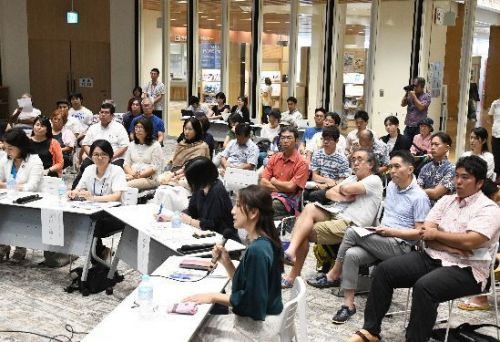Community roundtable for island-wide debate on SDGs and inclusivity

Attendees of the SDGs community roundtable listening attentively to a panelist at the Prefectural Library in Naha City, on September. 29.
September 29, 2019 Ryukyu Shimpo
“Community Roundtable to Promote SDGs”, a platform to allow island-wide discussions on advancing SDGs (United Nations sustainable development goals), was held on September 28 at the Okinawa Prefectural Library in Naha City.
A group of 80 residents participated in the first-ever community roundtable.
Jun Shimabukuro, chair of the The Bankoku Shinryo Committee (a group commissioned by Gov. Tamaki to advance SDGs) and professor at the University of the Ryukyus, engaged in a lively exchange with experts and participants on how to make Okinawa a leader in fostering a society in which ‘no one is left behind’.
Five other panelists were seated alongside Shimabukuro at the roundtable: Prefectural Planning Department Planning and Coordination Division Manager Hideharu Taira, Onna Village Office Planning Division Chief Kaori Touyama, Ryukyu Shimpo Assistant Managing Director Yoko Shima, Natsuko Shimabukuro from the Ryukyu Asahi Broadcasting news desk, and Keiko Sano, chief representative of JICA Okinawa Office. Mirai Fund Okinawa Vice President Tousei Taira moderated.
An participant pointed out that learning about the existing human rights and coexistence programs helps understand the SDGs better.
Another proposed involving educators and schools by implementing a system in which the prefectural government certifies schools that zealously pursue SDGs.
The discussions from the community roundtable will be further debated in the next Bankoku Shinryo Committee meeting.
During the floor discussion, participant Miwa Nakamura, 51, said: “I would love to see Gov. Tamaki transform Okinawa into a society that leaves no one behind.”
Nakamura’s son has a severe intellectual disability, and was rejected by the vocational high-school of his choice.
Nakamura pointed out, “Nationally, Okinawa has the lowest rate of students who continue on to high school.
Schools are rejecting students despite being under-enrolled; Maybe the students’ school-evaluations and marks were unsatisfactory, or they had an unsavory attitude during the interviews, but these children may have hardships in life, or faced adversities growing up.
Adults should not write off this fact as ‘reaping what you sow’. We need to heed the children’s voices, and incorporate them into Okinawa’s SDGs.”
(English translation by T&CT and Monica Shingaki)
Previous Article:OIST, Misawa Homes jointly awarded Good Design Award Best 100 for Sustainable Architecture
Next Article:Korean exchange students tour Okinawa to improve Japan-Korea relationships
[Similar Articles]
- Interview: Gov. Tamaki on cooperation and society’s role in personal fulfillment
- Bankoku Shinryo Conference proposes bringing attention to reducing base burden on Okinawa
- World Uchinanchu Festival plan for October 2021 under reconsideration due to coronavirus
- Editorial: Expert panel calls for public discourse on base-issues
- Team Yaeyama Norin makes final in low-carbon championship
 Webcam(Kokusai Street)
Webcam(Kokusai Street)


